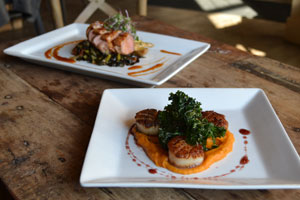Rib History {recipe}
Q. What is the history of BBQ ribs? — Mark, Menasha
A. Great question! Barbecue is considered by many to be the original American cuisine, as most other American cuisines are adaptations inspired by other cultures and countries. Barbecue is thought to be founded in the 1800s by cowboys while they were out on the range. Because better meats were used for society’s “upper class”, products like beef brisket (tough chest muscle from a steer), pork butts (tough, fatty shoulder cuts from hogs), and ribs (tough connective tissue and bones surrounding the hogs internal organs) were used to feed the masses. Cooks of those days discovered that by cooking tough meat “low and slow” over wood fires, it would eventually break down into delicious meals!
These meats, along with chicken, are used today as the foundation of Kansas City Barbecue Society competitions. Even more interesting is that due to supply and demand, the pork baby back rib started out as a byproduct, but today is the most expensive cut on the animal!
Chefs Gone Grillin’ Brisket Marinade
2 large yellow onions, chopped
2 cups canola oil
3 quarts soy sauce
1 quart Worcestershire sauce
1 quart brown sugar
½ cup garlic, granulated
¼ cup black pepper, table grind
2 Tbs baking soda
Hard sweat the onions in oil until soft, then puree the onions and the oil until a smooth, fine paste. Add the soy sauce, Worcestershire sauce, brown sugar, granulated garlic, pepper and baking soda to the onion puree and combine thoroughly.
Place the beef brisket (or other product) in the marinade and allow to marinate for at least 12 hours.
Slow smoke the brisket over indirect heat at 225°F for 12 hours. Place the smoked brisket in a warm, steamy environment for 3 hours. Remove exterior fat from the brisket.
Slice and present for service! This flavor profile would do well complimented with a hearty, sweet barbecue sauce.










Leave a Comment